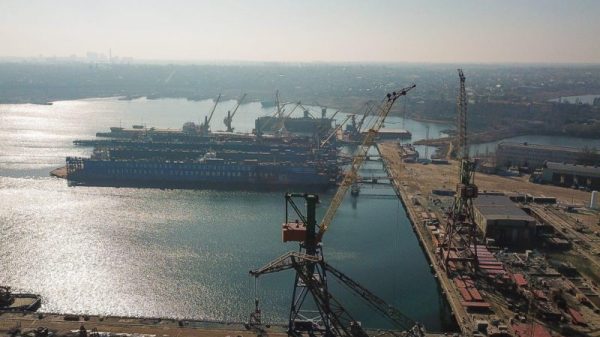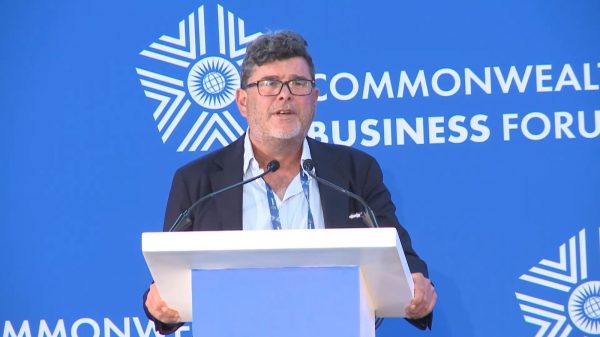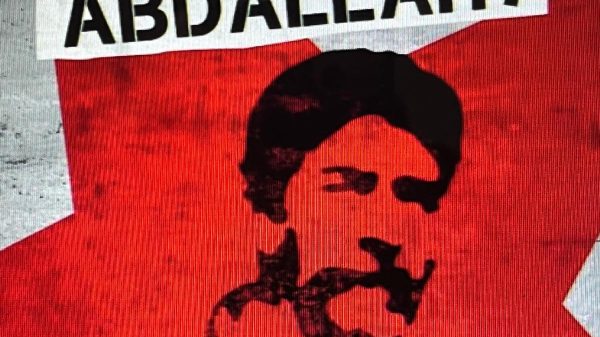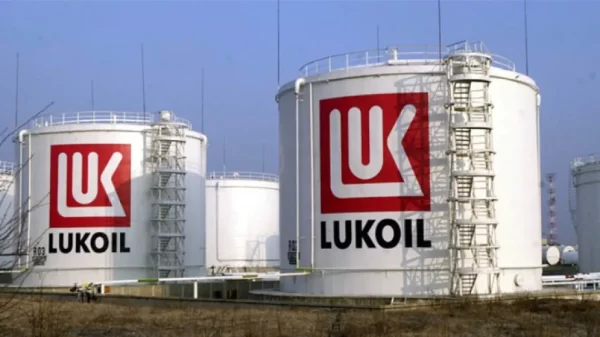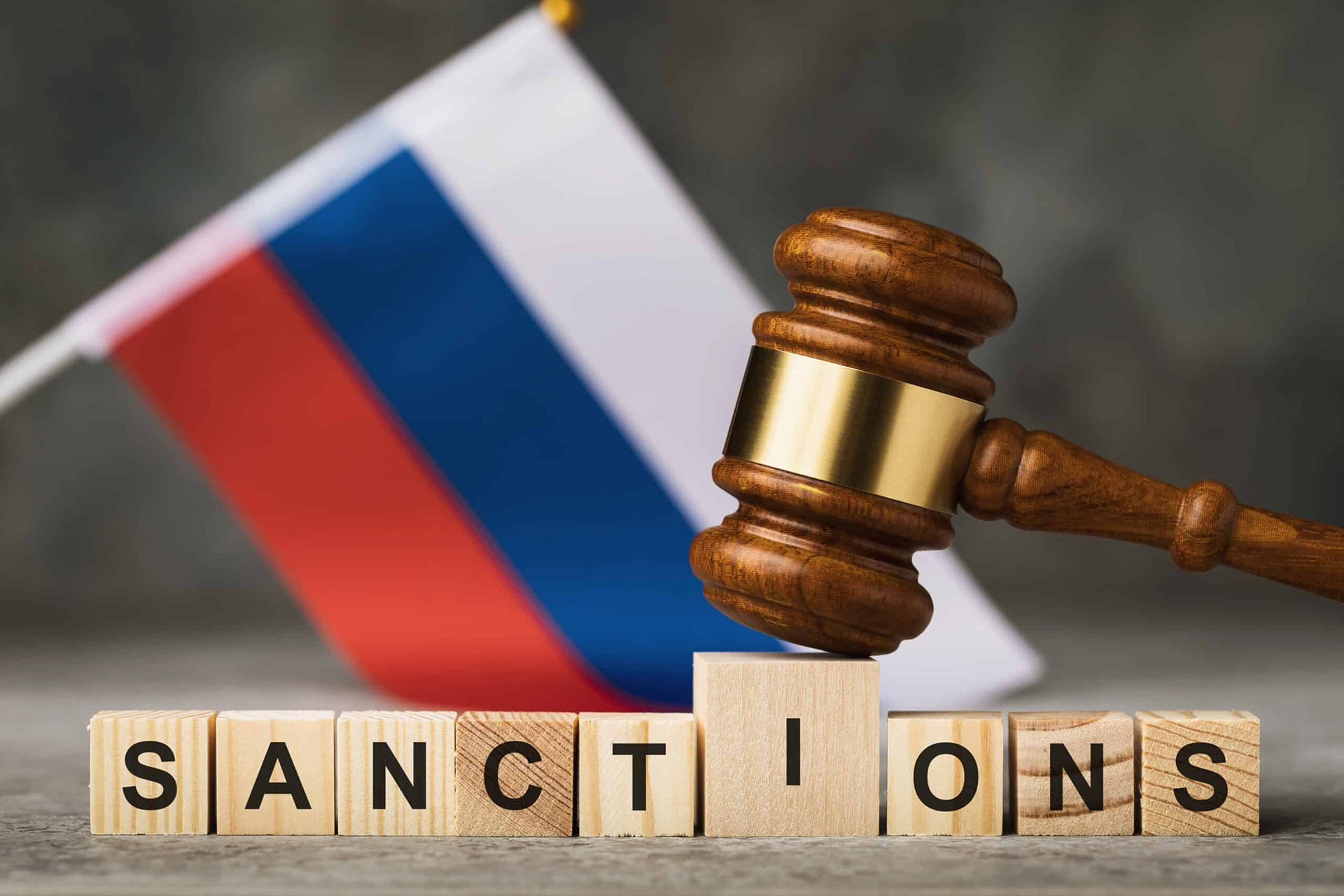An exhaustive new study welcomes western sanctions against Russia’s “aggression” in Ukraine but calls for a “constructive critique” of their current effectiveness. The legal study, authored by two experienced, Berlin-based lawyers, states that sanctions, or “restrictive measures”, are to be welcomed as they are an “important” and “effective” tool.
Sanctions “send a clear signal of disapproval” to the Russian regime over its invasion of Ukraine, it adds.
But the authors say there is still “room for improvement” and call for a “constructive” review of current sanctions so as to make them “more effective”.
The study findings of the report and current sanctions against Russia were debated at a day-long Brussels conference, attended by about 170 legal experts and political scientists in person and via livestream, on 23 March. It was organised by NAIMA Strategic Legal Services.
The report was authored by Dr Anna Oehmichen, founder and lawyer at Oehmichen International, a Berlin-based law company which specialises in cross-border crime, and Salomé Lemasson, a criminal lawyer and head of EU Business Crime and Regulatory Practice Group of Rahman Ravelli. Speaking to this website, Dr Oehmichen said she wanted to stress that both authors and the report did not think sanctions should be lifted. She pointed out that the aim of the study – and conference – was to provide a “constructive critique” on how the sanctions could be made more effective. Dr Oehmichen said, “We are not calling for sanctions to be lifted and that must be stressed. They are a good idea and are a more moderate response than military action. Sanctions have the potential to be very effective.” She said they both wanted the war to stop.
“Sanctions were designed to put pressure on President Putin and his regime in order to stop the invasion but it is difficult to say how effective they have been because we do not know what the situation would be without sanctions in place.”
Dr Oehmichen said, “We are not against sanctions which should remain but there needs to be a constructive and critical assessment in order to make them even more effective.”
The report, she noted, highlights several “issues of concern” where there is “room for improvement.”
These, it asserts, include a potential “lack of legal certainty”, the rule of law, the “criminal nature” of sanctions and possible “discrimination” in their application.
The report’s summary states that “while restrictive measures somehow should pertain to a concerned persons’ alleged involvement in the international crisis concerned or misconduct at stake, it is alarming that some of the provisions have as a sole criterion the (Russian) nationality of the concerned person. Using nationality as a stand-alone criterion to justify sectoral restrictions is a dangerous and slippery slope that directly endangers the very existence of the rule of law.”
Dr Oehmichen added that some of the “terms of criterion are too vague and this makes it hard for European operators to navigate through them.”
In her opening address to the conference, which was also live streamed to an EU-wide audience, she repeated that the study sought a “critical assessment” in order to “make sanctions work better in the future.”
She said sanctions had been implemented at an “unprecedented speed” but noted, “I must emphasise that this study is meant as a constructive critique.”
So far up to 300,000 people have died in the bitter conflict but some believe sanctions have done relatively little to persuade the Kremlin to stop its unprovoked and unnecessary war.
Numerous countries have acted, including the UK which has reportedly sanctioned more than 1,200 people and 120 businesses since Russia’s invasion of Ukraine. This includes sanctioning major banks well as phasing out oil imports and banning the export of critical technologies.
But some claim that sanctions have merely hardened public opinion in Russia with Russians rallying around the flag.
The EU recently adopted its tenth sanctions package against Russia and the long list of measures range from asset freezes and travel bans to sectoral economic sanctions and financial restrictions.
Another speaker at the event was Nicolay Petrov, a political scientist and expert of post-Soviet Russia at the German Institute for International & Security Affairs in Berlin.
Speaking to this site, he also said he was “very much in favour of sanctions”, adding that he also wanted, “along with everyone else”, to see Russia withdraw from Ukraine immediately and for an end to the war.
He added, “I want to state that I am, of course, against the war in Ukraine and that Russia should withdraw. Sanctions are very important and should be an effective and dynamic tool.
“A year ago when the decision was made to impose sanctions it was essentially to stop the war and now is a good time to consider if they have worked well or whether a more sophisticated approach would help in making sanctions more effective. One must not forget also that there is a list of oligarchs close to the Russian power that are unknown to the EU authorities”, Petrov said.
Nikolay Petrov, an expert on developments in post-Soviet Russia, explained under the heading “Are all oligarchs the same?” that there are very different groups of oligarchs and that practically none of the “rich Russians” have any significant influence on Putin and his policies. “There is practically no oligarch left who is independent of Putin.”
As a result of the sanctions, the “wealthy Russians” have been forced back into Russia and their money and property with them. Here, in Russia, they are at Putin’s mercy. The belief of Western politicians that they could exert pressure on the so-called oligarchs through the sanctions so that they, in turn, could persuade Putin to give up his war aims, he rejected as a misconception.
“A year ago when the decision was made to impose sanctions it was essentially to stop the war and now is a good time to consider if they have worked well or whether a more sophisticated approach would help in making sanctions more effective. One must not forget also that there is a list of oligarchs close to the Russian power that are unknown to the EU authorities”, Petrov said.
While the EU celebrated the sanctioning of the “oligarchs” who are highly visible in public and confiscated their yachts and properties, all the oligarchs who are not visible, the so-called “black oligarchs”, were not sanctioned. They had remained in Russia and never flaunted their wealth, which came close to the oligarchs’ wealth visible in the West. “The EU policy aimed at a quick applause,” Petrov said. Petrov also pleaded for a readjustment of the sanctions packages.
Welcoming the audience, Uwe Wolff, CEO of Berlin-based NAIMA Strategic Legal Services, specializing in Litigation-PR and strategic legal communication and working on numerous transnational cases, said it was “clear that no one in this room would question the fundamental need for sanctions which are an important and powerful response to Russia’s war of aggression that it is waging in Ukraine and which is in direct violation of international law.”
He added, “A tough response was, and is, needed to this. But let us also not turn a blind eye to any inconsistencies in what we are doing and that sanctions were decided in a hurry and under intense international pressure.”
He said, “Everyone can understand that mistakes are made in such a situation and under such pressure, and certain consequences are not thought through. One example is the criteria for which individuals and companies end up or have ended up on the sanctions lists. It’s no secret that Google has played an enormous role in that.”
“One of the fundamentals of our law is that you have to justify why someone is punished or sanctioned. Where evidence or proof is lacking, where inadmissible labeling takes place, or where nationality alone becomes the criterion, we leave the safe ground of our law and thus make ourselves vulnerable to attack.”
“The prohibition to provide legal advisory services, for example, and thus the restricted access of an affected person to a lawyer, was particularly strongly criticized. This is quite contrary to the core of a constitutional state.”
He said, “We have been contacted by numerous lawyers who have expressed such concerns and that is why we commissioned this legal opinion/study to look at the effectiveness of sanctions.” He stressed, “We want to be constructive and just have a debate about this because the aim should be to strengthen sanctions and make them more effective. We want to help strengthen sanctions to make them more resistant to attacks from rightly sanctioned individuals or companies. We want to help ensure that the sanctions regime accurately reflects the rule of law from which it was born.”
The report, which can be downloaded from the organiser’s website, looks at the “impact, feasibility and quality” of sanctions which have been imposed by the EU and rest of the international community.
It expresses concern that restrictive measures may have “been drafted and enacted almost too quickly” and that the terms “are often vague and therefore difficult to apply.”
The study also points to what it claims is “the prohibition to provide legal advisory services” to those on the EU Consolidated Sanctions List.
Separately, a group of independent defence lawyers from Paris and Brussels have also recently sent an open letter to the European Commission outlining their reservations about the current sanctions regime which, it is said, include concerns surrounding “clear procedural safeguards”, the standard of proof needed to be put on sanctions lists and a “lack of consistency”.
Others have, separately, also raised questions about the impact of current sanctions. In a report, Bruegel, a respected Brussels-based think tank that specialises in economics, says, “When Russia first invaded Ukraine almost a year ago, many countries condemned the aggression and applied sanctions in an attempt to squash its economy and isolate it from global engagement. Nevertheless, the fact remains that Russian revenues have not been affected in a way that would have inhibited its ability to wage war.”
The Economist, in an article, said the West had imposed an “arsenal of sanctions” but added, “Worryingly, so far the sanctions war is not going as well as expected.” This website asked the European Commission to respond to the legal study presented in Brussels on Thursday.
Peter Stano, lead spokesperson for Foreign Affairs and Security Policy, said, “The EU sanctions will show their full impact and effect only over mid- and long-term but the impact of the sanctions is obvious already now, since it is also thanks to the sanctions (in combination with other instruments used) that Putin did not succeed in his invasion, was not able to sustain the offensive across Ukraine and was forced to retreat to the east where he has not made any meaningful gains nor progress yet.”
He added, “The EU sanctions are not the only instrument the EU is using to react to Russia’s aggression and it would be an illusion to think that sanctions alone would be able to stop the war. The aim of the sanctions is to limit Putin’s ability to continue to finance the illegal aggression against Ukraine and it is obvious that he is facing enormous problems to ensure supplies and restocking for his troops.”
He went on, “The sanctions complement other EU policies and measures taken to help Ukraine to defeat the aggressor: the EU is helping Ukraine financially, economically, with humanitarian and military assistance as well as with international and diplomatic support aimed at increasing isolation of Russia and pressure on the Kremlin to stop the aggression. The sanctions affected big parts of Russian trade (export/import), financial services and the ability of the Russian economy to modernize itself.”




